For 和since的用法
现在完成时Since和for的用法
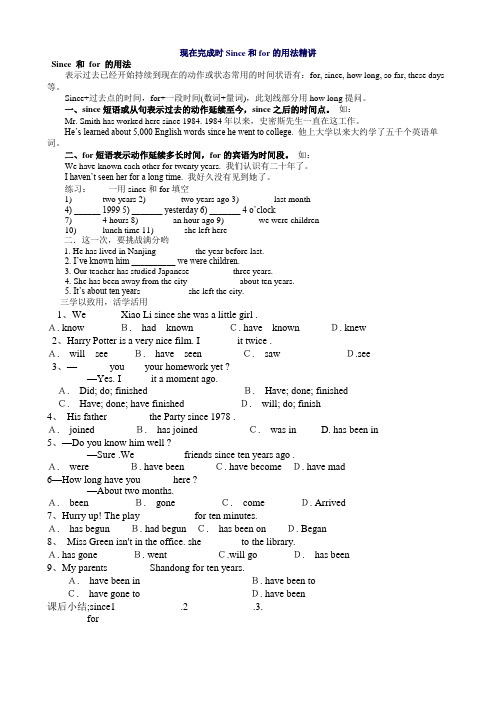
现在完成时Since和for的用法精讲Since 和for 的用法表示过去已经开始持续到现在的动作或状态常用的时间状语有:for, since, how long, so far, these days 等。
Since+过去点的时间,for+一段时间(数词+量词),此划线部分用how long提问。
一、since短语或从句表示过去的动作延续至今,since之后的时间点。
如:Mr. Smith has worked here since 1984. 1984年以来,史密斯先生一直在这工作。
He’s learned about 5,000 English words since he went to college. 他上大学以来大约学了五千个英语单词。
二、for短语表示动作延续多长时间,for的宾语为时间段。
如:We have known each other for twenty years. 我们认识有二十年了。
I haven’t seen her for a long time. 我好久没有见到她了。
练习:一用since和for填空1) ______ two years 2) _______ two years ago 3) _______ last month4) ______ 1999 5) _______ yesterday 6) _______ 4 o’clock7) ______ 4 hours 8) _______ an hour ago 9) _______ we were children10) _____ lunch time 11) ______ she left here二.这一次,要挑战满分哟1. He has lived in Nanjing ________ the year before last.2. I’ve known him __________ we were children.3. Our teacher has studied Japanese _________ three years.4. She has been away from the city ___________ about ten years.5. It’s about ten year s __________ she left the city.三学以致用,活学活用1、We ______ Xiao Li since she was a little girl .A. know B. had known C. have known D. knew2、Harry Potter is a very nice film. I_______ it twice .A. will see B. have seen C. saw D.see3、—______ you ___ your homework yet ?—Yes. I _____ it a moment ago.A. Did; do; finished B. Have; done; finishedC. Have; done; have finished D. will; do; finish4、His father ______ the Party since 1978 .A. joined B. has joined C. was in D. has been in5、—Do you know him well ?—Sure .We _________ friends since ten years ago .A. were B. have been C. have become D. have mad6—How long have you ____ here ?—About two months.A. been B. gone C. come D. Arrived7、Hurry up! The play __________ for ten minutes.A. has begun B. had begun C. has been on D. Began8、Miss Green isn't in the office. she _______ to the library.A. has gone B. went C.will go D. has been9、My parents ______ Shandong for ten years.A. have been in B. have been toC. have gone to D. have been课后小结;since1_____________.2_____________.3. _____________for_____________。
since、for的用法
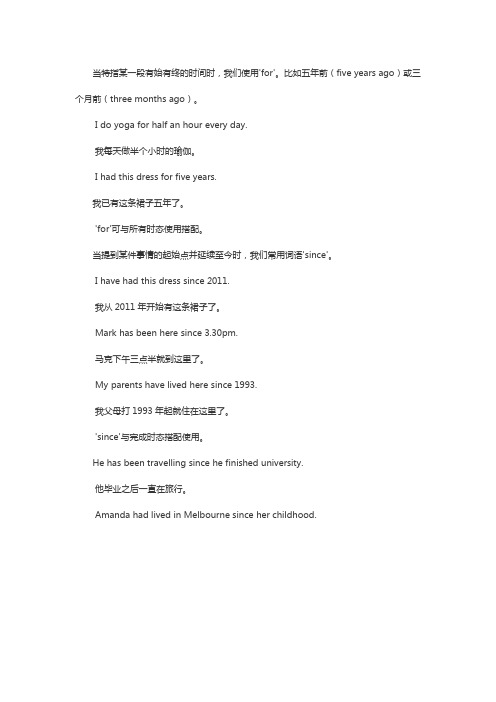
当特指某一段有始有终的时间时,我们使用'for'。
比如五年前(five years ago)或三个月前(three months ago)。
I do yoga for half an hour every day.
我每天做半个小时的瑜伽。
I had this dress for five years.
我已有这条裙子五年了。
'for'可与所有时态使用搭配。
当提到某件事情的起始点并延续至今时,我们常用词语'since'。
I have had this dress since 2011.
我从2011年开始有这条裙子了。
Mark has been here since 3.30pm.
马克下午三点半就到这里了。
My parents have lived here since 1993.
我父母打1993年起就住在这里了。
'since'与完成时态搭配使用。
He has been travelling since he finished university.
他毕业之后一直在旅行。
Amanda had lived in Melbourne since her childhood.。
现在完成时Since和for的用法
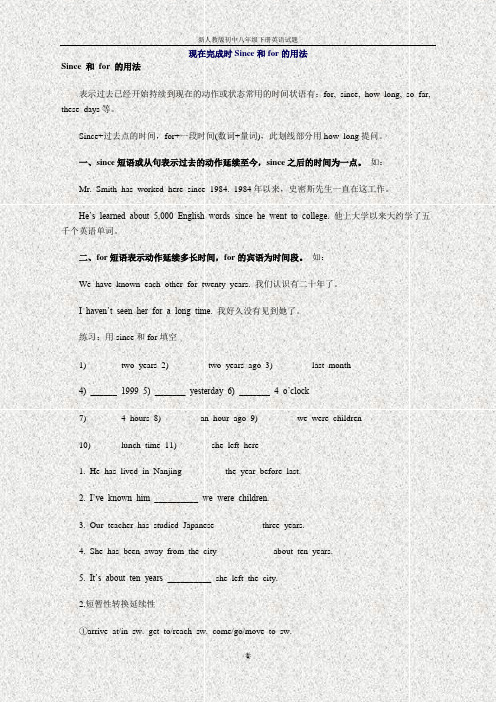
现在完成时Since和for的用法Since 和for 的用法表示过去已经开始持续到现在的动作或状态常用的时间状语有:for, since, how long, so far, these days等。
Since+过去点的时间,for+一段时间(数词+量词),此划线部分用how long提问。
一、since短语或从句表示过去的动作延续至今,since之后的时间为一点。
如:Mr. Smith has worked here since 1984. 1984年以来,史密斯先生一直在这工作。
He’s learned about 5,000 English words since he went to college. 他上大学以来大约学了五千个英语单词。
二、for短语表示动作延续多长时间,for的宾语为时间段。
如:We have known each other for twenty years. 我们认识有二十年了。
I haven’t seen her for a long time. 我好久没有见到她了。
练习:用since和for填空1) ______ two years 2) _______ two years ago 3) _______ last month4) ______ 1999 5) _______ yesterday 6) _______ 4 o’clock7) ______ 4 hours 8) _______ an hour ago 9) _______ we were children10) _____ lunch time 11) ______ she left here1. He has lived in Nanjing ________ the year before last.2. I’ve known him __________ we were children.3. Our teacher has studied Japanese _________ three years.4. She has been away from the city ___________ about ten years.5. It’s about ten years __________she left the city.2.短暂性转换延续性①arrive at/in sw. get to/reach sw. come/go/move to sw.→ be in sw./at school/at home/on the farm/be here/be there1) He got to Beijing five minutes ago.He ________ _________ _________ Beijing for _________ _________.2) I moved to the USA last year.I ________ ________ __________ the USA since __________ __________.3) I went home yesterday.I _______ ________ _________ home for _________ __________.4) They came here last week.They _________ _________ here since _________ __________.②come/go back, return → be back come/go out → be out1) He came out two years ago.He _________ __________ _________ for __________ __________.2) We return to Fuzhou yesterday.We ________ ________ _________ to Fuzhou since __________.③become → be1) I became a teacher in 2000.I ________ __________ a teacher for _________ _________.2) The river became dirty last year.The river _________ _________ dirty for _________ __________.④close → be closed open → be open1) The shop closed two hours ago.The shop ________ _________ _________ for _________ _________.2) The door opened at six in the morning.The door ________ ________ ________ for six hours.⑤get up → be up die → be deadleave sw. → be away from sw.fall asleep/get tot sleep → be asleepfinish/end → be over marry → be married1) I got up two hours ago.I ________ ________ ________ since ________ ________.2) He left Fuzhou just now.He _______ ________ ________ _________ Fuzhou for five minutes.3) My grandpa died in 2002.My grandpa _______ _______ ________for _______ ________.4) The meeting finished at six.The meeting ________ ______ ______ for six hours.5) I got to sleep two hours ago.I ________ _________ _________ since _________ __________.6) They married in 1990.They ________ _________ __________since _________.⑥start/begin to do sth. → do sth. begin → be on1) I began to teach at this school in 1995.I ____ ____ at this school since ____.2) The film began two minutes ago.The film ____ ____ ____ for ____ ____.⑦borrow → keep lose → not have buy → have put on → wearcatch/get a cold → have a cold get to know → know1) They borrowed it last week.They _________ _________ it since __________ __________.2) I bought a pen two hours ago.I _________ _________ a pen for ________ __________.3) I got to know him last year.I _________ __________ him since __________ __________.4) I put on my glasses three years ago.I __________ __________ my glasses for _________ _________.⑧have/has gone to → have been in1) He has gone to Beijing.He ____ ____ _____ Beijing for two days.⑨join the league/the Party/the army→ be a league/a Party member/a soldier→ be a membe r of the league/the Party→ be in the league/the Party/the army1) He joined the league in 2002.He ________ _________ a _________ _________ for two years.He ________ __________ a __________ ___________ the __________ for two years. He ____________ ___________ ___________ the league for two years.2) My brother joined the army two years ago.My brother __________ __________ a ___________ for ___________ ___________. My brother ___________ ___________ in ____________ ___________ for two years.3.汉译英1)这本字典我已买了三年了。
Since和for的用法及区别
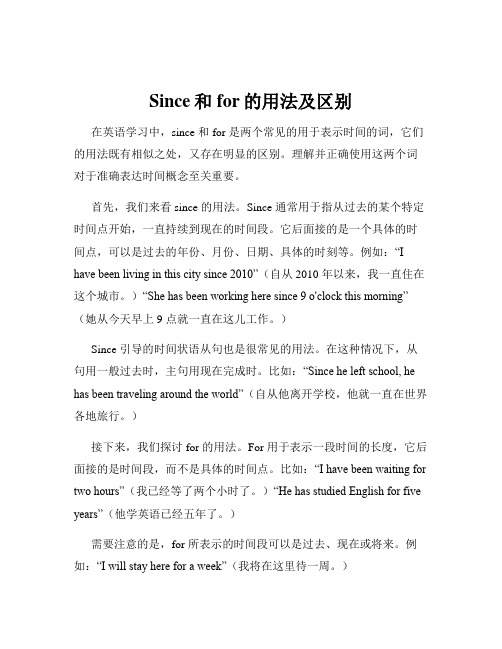
Since和for的用法及区别在英语学习中,since 和 for 是两个常见的用于表示时间的词,它们的用法既有相似之处,又存在明显的区别。
理解并正确使用这两个词对于准确表达时间概念至关重要。
首先,我们来看 since 的用法。
Since 通常用于指从过去的某个特定时间点开始,一直持续到现在的时间段。
它后面接的是一个具体的时间点,可以是过去的年份、月份、日期、具体的时刻等。
例如:“I have been living in this city since 2010”(自从 2010 年以来,我一直住在这个城市。
)“She has been working here since 9 o'clock this morning”(她从今天早上 9 点就一直在这儿工作。
)Since 引导的时间状语从句也是很常见的用法。
在这种情况下,从句用一般过去时,主句用现在完成时。
比如:“Since he left school, he has been traveling around the world”(自从他离开学校,他就一直在世界各地旅行。
)接下来,我们探讨 for 的用法。
For 用于表示一段时间的长度,它后面接的是时间段,而不是具体的时间点。
比如:“I have been waiting for two hours”(我已经等了两个小时了。
)“He has studied English for five years”(他学英语已经五年了。
)需要注意的是,for 所表示的时间段可以是过去、现在或将来。
例如:“I will stay here for a week”(我将在这里待一周。
)既然我们已经了解了 since 和 for 的基本用法,那么它们的区别又在哪里呢?一个重要的区别在于 since 强调的是动作或状态的起始点,而 for 强调的是动作或状态持续的时长。
比如,“I have known her since 2015” 重点在于从 2015 年这个起点开始认识她;而“I have known her for five years” 重点在于认识她的时间长度是五年。
since和for的用法
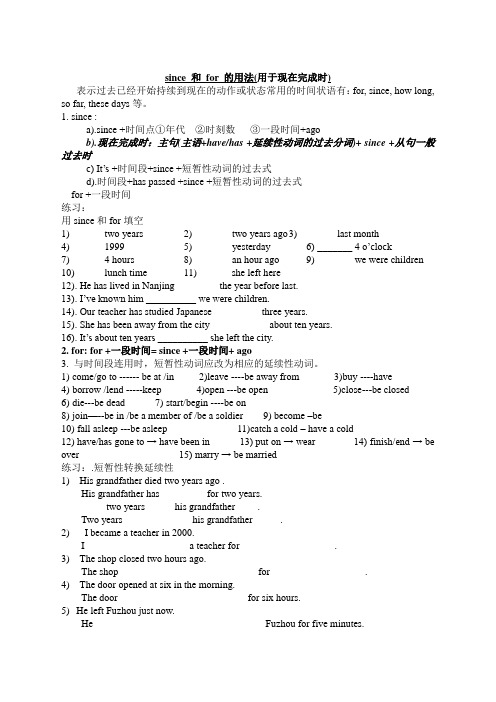
since 和for 的用法(用于现在完成时)表示过去已经开始持续到现在的动作或状态常用的时间状语有:for, since, how long, so far, these days等。
1. since :a).since +时间点①年代②时刻数③一段时间+agob).现在完成时:主句(主语+have/has +延续性动词的过去分词)+ since +从句一般过去时c) It’s +时间段+since +短暂性动词的过去式d).时间段+has passed +since +短暂性动词的过去式for +一段时间练习:用since和for填空1) ______ two years 2) _______ two years ago 3) _______ last month4) ______ 1999 5) _______ yesterday 6) _______ 4 o’clock7) ______ 4 hours 8) _______ an hour ago 9) _______ we were children 10) _____ lunch time 11) ______ she left here12). He has lived in Nanjing ________ the year before last.13). I’ve known him __________ we were children.14). Our teacher has studied Japanese _________ three years.15). She has been away from the city ___________ about ten years.16). It’s about ten years __________ she left the city.2. for: for +一段时间= since +一段时间+ ago3. 与时间段连用时,短暂性动词应改为相应的延续性动词。
for和since的用法
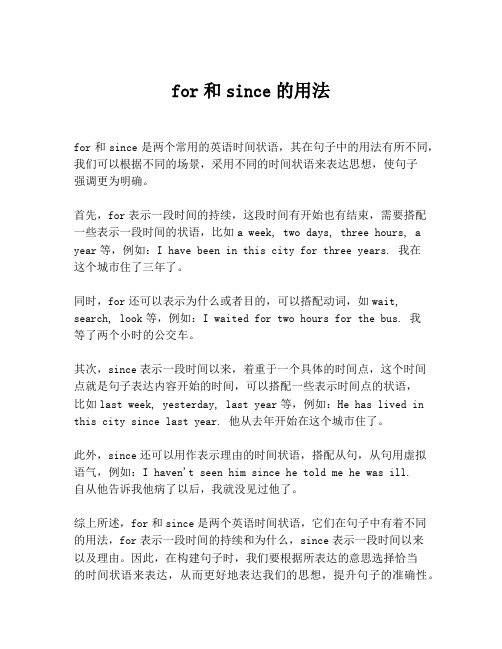
for和since的用法
for和since是两个常用的英语时间状语,其在句子中的用法有所不同,我们可以根据不同的场景,采用不同的时间状语来表达思想,使句子
强调更为明确。
首先,for表示一段时间的持续,这段时间有开始也有结束,需要搭配一些表示一段时间的状语,比如a week, two days, three hours, a year等,例如:I have been in this city for three years. 我在
这个城市住了三年了。
同时,for还可以表示为什么或者目的,可以搭配动词,如wait, search, look等,例如:I waited for two hours for the bus. 我
等了两个小时的公交车。
其次,since表示一段时间以来,着重于一个具体的时间点,这个时间点就是句子表达内容开始的时间,可以搭配一些表示时间点的状语,
比如last week, yesterday, last year等,例如:He has lived in this city since last year. 他从去年开始在这个城市住了。
此外,since还可以用作表示理由的时间状语,搭配从句,从句用虚拟语气,例如:I haven't seen him since he told me he was ill.
自从他告诉我他病了以后,我就没见过他了。
综上所述,for和since是两个英语时间状语,它们在句子中有着不同的用法,for表示一段时间的持续和为什么,since表示一段时间以来
以及理由。
因此,在构建句子时,我们要根据所表达的意思选择恰当
的时间状语来表达,从而更好地表达我们的思想,提升句子的准确性。
since和for的用法总结
since和for的用法总结一、介绍近年来,英语学习者常常困惑于"since"和"for"这两个词的用法。
在本文中,我们将对它们的使用进行总结和解释。
"since"和"for"都是表示时间段的介词,但在不同的语境中有着不同的用法。
了解它们的正确用法能够帮助我们更准确地表达时间概念。
二、"since"1. 表示自特定时间点开始到现在为止当我们想指明一个动作或事件从过去某个具体时刻开始持续到现在时,可以使用“since”。
例如:“I have been studying English since I was young.”(我从小就开始学英语。
)其中,“since”引导了一个过去的具体时间点。
2. 表示因果关系除了表示时间段, "since" 在某些情况下也可以表示因果关系。
当我们想要表达某个事件成为结果或发生原因时,可以使用 "since" 进行引导。
“Since it is raining, we should stay indoors.”(因为下雨了,我们应该呆在室内。
)通过这个句子,“since”引导了一个原因,并且帮助解释环境中所出现的情况。
三、“for”1. 表示一段持续时间与“since”不同,“for”通常被用来表示一个动作或事件持续的一段时间。
例如:“I have been studying English for five years.”(我已经学习英语五年了。
)这个例子中,“for”引导了一个时间段。
2. 表示目的、原因或对比此外,"for"在其他语境中也会被用来表示目的、原因和对比等意义。
“She studied hard for a better future.”(她为了更好的未来而努力学习。
)在这个句子中,“for”表示目标。
现在完成时for 和since用法
现在完成时二用法:过去完成时表示过去发生的动作或存在的状态一直持续到现在(包括现在在内),常与for和since引导的时间状语连用,动词需要用延续性动词。
如:Mr.Green has been in China for 10 years .(格林先生来中国10年了)The film has been on for 20 minutes.(电影开始已经20分钟了)Since 与for的区别:for后面跟一段时间如:for three days for 2 years 等+ 过去的时间点:since 2004Since+ 一段时间ago :since two minutes ago+ 过去时的句子:since I came to this school用since 和for 填空:1.I have kept the book _______ a week , I must return it on time .2.We have learned English _______ 5 years ago, so we have learned it ______ 5 years.3.Miss Li has taught maths ________ she came to this school ..4.I have had a cold _______ yesterday.5.The workers have worked _______ 10 hours . They are very tired.6.Great changes have taken place in China ______ it was founded.7.Our teacher has studied Japanese ______ three years.8. She has been away from the city ______ about ten years.9.. It’s about ten years __________ she left the city.短暂性动词的完成时态不能和表示一段的时间状语连用,当它需要与表示一段时间的时间状语连用时,通常需进行转化,见书119页。
(完整word)since 和 for 的用法
since 和for 的用法(用于现在完成时)表示过去已经开始持续到现在的动作或状态常用的时间状语有:for, since, how long, so far, these days等。
1. since :a)。
since +时间点①年代②时刻数③一段时间+agob)。
现在完成时:主句(主语+have/has +延续性动词的过去分词)+ since +从句一般过去时c) It’s +时间段+since +短暂性动词的过去式d)。
时间段+has passed +since +短暂性动词的过去式for +一段时间练习:用since和for填空1) ______ two years 2) _______ two years ago 3) _______ last month4) ______ 1999 5) _______ yesterday 6)_______ 4 o’clock7) ______ 4 hours 8) _______ an hour ago 9) _______ we were children 10) _____ lunch time 11) ______ she left here12). He has lived in Nanjing ________ the year before last。
13). I’ve known him __________ we were children。
14)。
Our teacher has studied Japanese _________ three years.15)。
She has been away from the city ___________ about ten years.16). It’s about ten years __________ she left the city。
2。
for: for +一段时间= since +一段时间+ ago3。
【易混点拨】since和for的用法解析
【易混点拨】since和for的用法解析表示过去已经开始持续到现在的动作或状态常用的时间状语有:for, since, how long, so far, these days等。
since+过去点的时间,for+一段时间(数词+量词),此划线部分用how long提问。
一、since短语或从句表示过去的动作延续至今,since之后的时间为一点。
即since+表示过去一个时间点,如1980,last month,half past six 等。
如:Mr. Smith has worked here since 1984.1984年以来,史密斯先生一直在这工作(1)since+ 一段时间+ago。
如:Millie has waited there since half an hour ago. 米莉半小时前就在那儿等了。
(2)since+从句(从句用一般过去时)。
如:He’s learned about 5,000 English words since he went to college.他上大学以来大约学了五千个英语单词。
(2)It is/has been +一段时间+since从句。
如:It is a month since Simon came back. 西蒙已经回来一个月了。
二、for短语表示动作延续多长时间,for的宾语为时间段。
即for +一段时间。
如:We have known each other for twenty years. 我们认识有二十年了。
I haven’t seen her for a long time. 我好久没有见到她了。
1/ 1。
- 1、下载文档前请自行甄别文档内容的完整性,平台不提供额外的编辑、内容补充、找答案等附加服务。
- 2、"仅部分预览"的文档,不可在线预览部分如存在完整性等问题,可反馈申请退款(可完整预览的文档不适用该条件!)。
- 3、如文档侵犯您的权益,请联系客服反馈,我们会尽快为您处理(人工客服工作时间:9:00-18:30)。
区别瞬间动词和延续性动词
瞬间动词:发生的时间短暂,不能和延续性 的时间词连用。 如:buy, close
延续性动词: 动作可以延续,或者就是一个 状态。如:be, keep, stay
我买这本书3年了。 I have had the book for 3 years. Mary的爷爷从2010年去世至今。 Mary’s grandpa has been dead since 2010
4. Mr. Smith has worked here _s_in_c_e__he came to China.
5. His grandpa has been dead _fo_r_ several years.
Think it over!Are they right?
我买这本书3年了。 I have bought the book for 3 years. X Mary的爷爷从2010年去世至今。 Mary’s grandpa has died since 2010 X
选用for、since填空
1. We haven’t seen each other f_o_r__ a long time. 2. His father has been in this factory _s_i_n_c_e10
years ago.
3. The film has been on _fo_r__ 10 minutes.
for 和since的用法
区分点时间和段时间
5:30 5 years 3 minutes 2002 May 5th 2 mo续了多久 I have been a teacher for 10 years.
since+过去的某个点时间,表示自从..时候起 I have been a teacher since 2010. I have been a teacher since he left Zhuzhou.
Translation
• 我借他的书有2个月了。
• 自从10年前,Tom 已经来了株洲。
• 他买这本书1年了。
• 从2010年起,他已经是个有名的歌手了。
转换
come/go – be (in /at) I have been in Zhuzhou for …. buy – have I have had the book for… borrow – keep I have kept the book for…. die – be dead He has been dead for… become – be I have been a teacher for… marry – be married They have been married for… open – be open The door have been open for….
